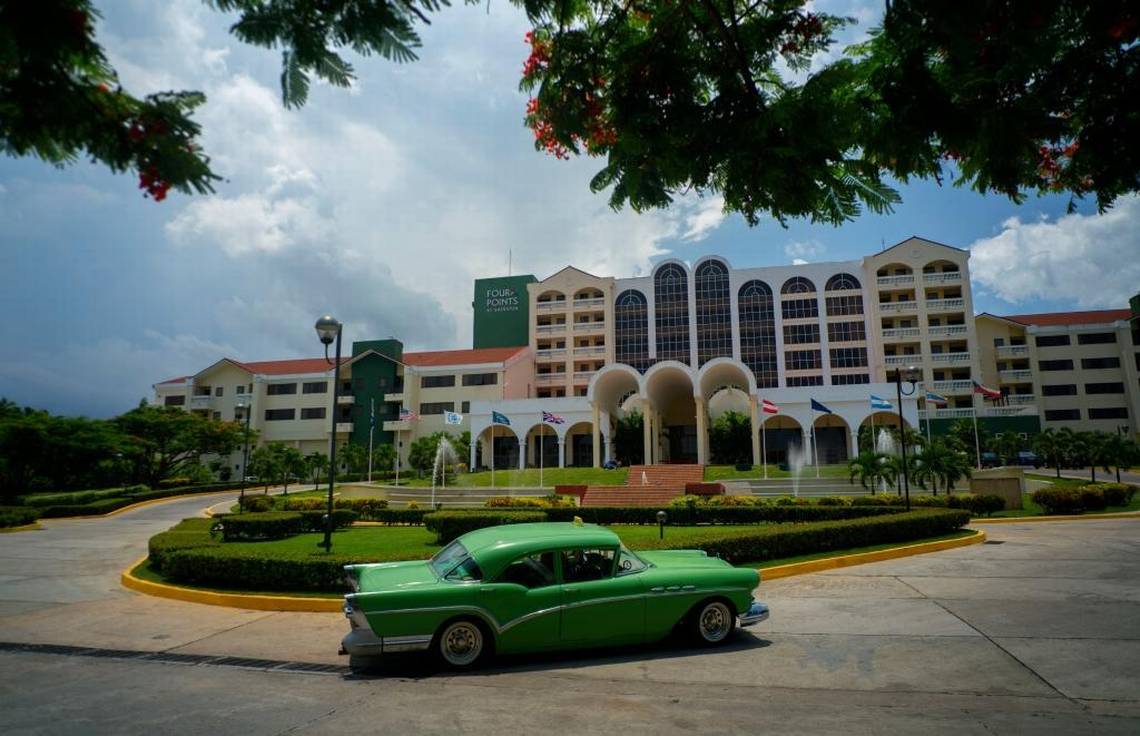
The Four Points by Sheraton Hotel in Havana is owned by the military-run Gaviota and is managed by the U.S. Corporation Starwood hotel chain. Gaviota is part of the military conglomerate GAESA. Obama violated the Helms-Burton Law and the Cuban embargo by authorizing hotel chains to do business with the Cuban military.
On June 13, 2017, Nora Gámez Torres wrote an article titled “High on Cuba policy proposal: Restricting U.S. business deals with Cuba’s military-run entities” which was published by the Miami Herald. The reporter said that Cuban-American members of Congress have been pushing the President Trump administration to restrict deals between U.S. corporations and military-controlled Cuban firms, as part of the new Cuban policy expected to be announced this week in Miami.
President Trump is expected to announce his new Cuban policy on June 16, 2017 at the Manuel Artime Theater in Little Havana in Miami. Restricting American corporations from doing business with the military in Cuba is being seriously considered by the White House. However, White House spokeswoman Helen Aguirre Ferré confirmed on June 12, 2017 that the proposal is under consideration, but added that it was “one of the many possibilities under discussion.”
Gámez Torres explained that GAESA is the Spanish acronym for Grupo de Administración Empresarial, S.A. This military-run business conglomerate is owned by the Revolutionary Armed Forces and controls more than 50 enterprises.
The head of GAESA is General Luis Alberto Rodríguez López Calleja. According to reports, General Rodríguez López Calleja is married or was married to a daughter of the Cuban oppressive dictator Raúl Castro.
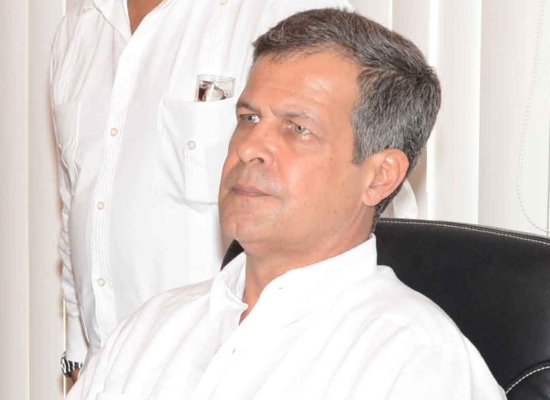
General Luis Alberto Rodríguez López Calleja is or was Cuban bloody dictator Raúl Castro’s son-in-law. Half or more of Cuba’s business activity runs through General Rodríguez López Calleja.
Gámez Torres stated the following: “If you’re a U.S. traveler in Cuba and you buy a bottle of water in the supermarket or a souvenir in a store, or you rent a car or a hotel room, it’s very likely that you’re putting money into the pockets of the military-run GAESA, which experts say controls nearly 60% (others estimate 80%) of the Cuban economy. GAESA operates in virtually every profitable area of the Cuban economy, controlling hotel chains, car rental agencies and sales companies, banks, credit card and remittance services, supermarkets, clothing shops, real estate development companies, gasoline stations, import and export companies, shipping and construction companies, warehouses and even an airline.”
The reporter pointed out that GAESA is the owner of the Gaviota hotel chain, which owns nearly 29,000 rooms in Cuba and serves an estimated 40% of the entire nation’s foreign tourism. Gaviota has signed management contracts for 83% of its rooms with international hotel chains, including Spain’s Meliá and the Swiss-based Kempinski.
As has been indicated earlier, Gaviota also has a business deal with Sheraton’s Starwood chain to administer the Four Points Hotel in Havana. This arrangement was allowed by policy changes under the Obama administration. This writer believes that this deal was a major violation by former President Obama of the commercial embargo as well as the Helms-Burton Law.
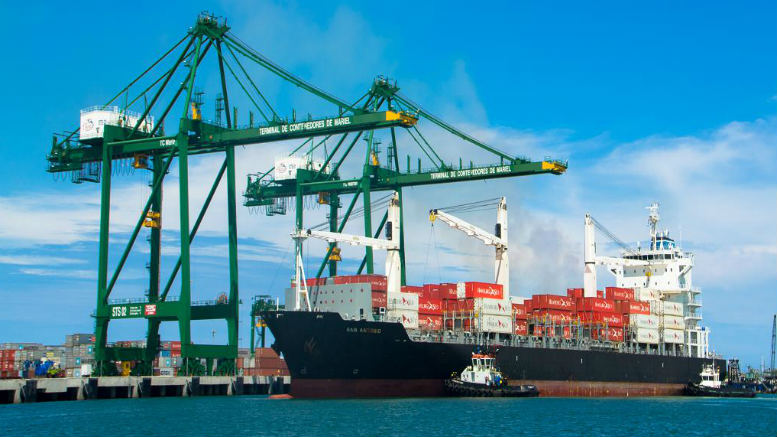
The modern Port of Mariel was built by the corrupt Brazilian Odebrecht Company with funding from President Dilma Rousseff’s government.
Gámez Torres wrote that GAESA’s Almacenes Universales S.A., for example, controls the container terminal in the Port of Mariel, which receives most of the cargo that once arrived at the port of Havana. The terminal was built by Brazil’s Odebrecht Company with funding from former President Dilma Rousseff’s government.
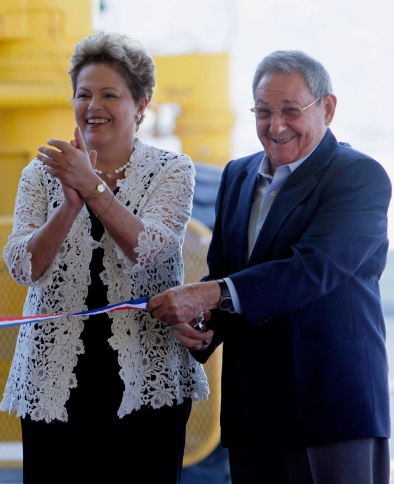
On January 27, 2014, corrupt leftist Brazilian President Dilma Rousseff and Cuban dictator Raúl Castro formally opened the new port at Mariel.
On January 27, 2014, the port of Mariel was completed. Present at the inauguration were the assassin-in-series dictator Raúl Castro, Venezuelan bloody dictator Nicolás Maduro, and radical Brazilian President Dilma Rousseff. The port of Mariel has more than a dozen big cranes, a 700-meter-long pier which can handle the world’s biggest container ships, a highway, and a rail line to Havana. The port of Mariel was financed by Brazil’s state development bank in a deal negotiated directly between dictator Raúl Castro and Luiz Inácio Lula da Silva, the former radical Brazilian president. The port of Mariel includes a 180-square-mile foreign trade zone.
Rousseff was successfully impeached by the Brazilian Congress. The owners of Odebrecht Company were convicted of giving kickbacks to government officials and are currently in prison.
Sadly, many multinational corporations from the United States and other nations want to make Cuba the China of the Caribbean. These corporations would like to use Cuban workers, who make between $20 and $25 a month salary and have no rights whatsoever. These multinational corporations do not care about the suffering of the Cuban people under the worst and longest dictatorship in the Western Hemisphere.
Gámez Torres said that Western Union in Cuba uses the infrastructure of FINCIMEX (Financiera Cimex) to send remittances to Cuba. FINCIMEX processes VISA and MASTERCARD transactions on the island. FINCIMEX also handles remittances sent to Cuba through companies like VaCuba. The room-rental company Airbnb, which saw its operations in Cuba expand enormously after the Obama Administration approved it, may be affected by any change because it pays home and apartment owners through VaCuba, a military operated company.
Gámez Torres explained that “GAESA expanded even further in 2016 when it took over Cuba’s International Financial Bank (BFI) as well as Habaguanex, a corporation that Fidel Castro had favored with a special license to run hotels, shops and restaurants in Old Havana.”
Gámez Torres ended her article by pointing out that “restrictions by the Trump administration on doing business with Cuba’s military-run companies, if imposed, would impact more than tourism because GAESA operates in virtually every sector of the island’s economy — with the exception of telecommunications and agriculture.”
The immense power of General Luis Alberto Rodríguez López Calleja
Michael Smith wrote an article titled “Want to Do Business in Cuba? Prepare to Partner With the General” which was published in the website SmithMarkets on September 30, 2015. The article originally appeared in the November 2015 issue of Bloomberg Markets under the named “Cuba: The Price of Doing Business in a New Economy.”
Smith explained that in order to do most businesses in Cuba investors must see General Luis Alberto Rodríguez López Calleja, who is or was Raúl Castro’s son-in-law. Smith visited Cuba and said that he saw Havana’s redevelopment in progress. Near El Floridita, where Ernest Hemingway once knocked back daiquiris, the hulking Manzana de Gómez building is being transformed into a five-star hotel.
The hotel is now completed. It is owed by Gaviota, the tourist corporation that belongs to the military and is run by the Swiss luxury hotel chain Kempinski. This is how foreign corporations must do business in communist Cuba. As indicated earlier, President Donald J. Trump may forbid American corporations to do business in Cuba with dictator Raúl Castro’s military when he announces his Cuban new policy.
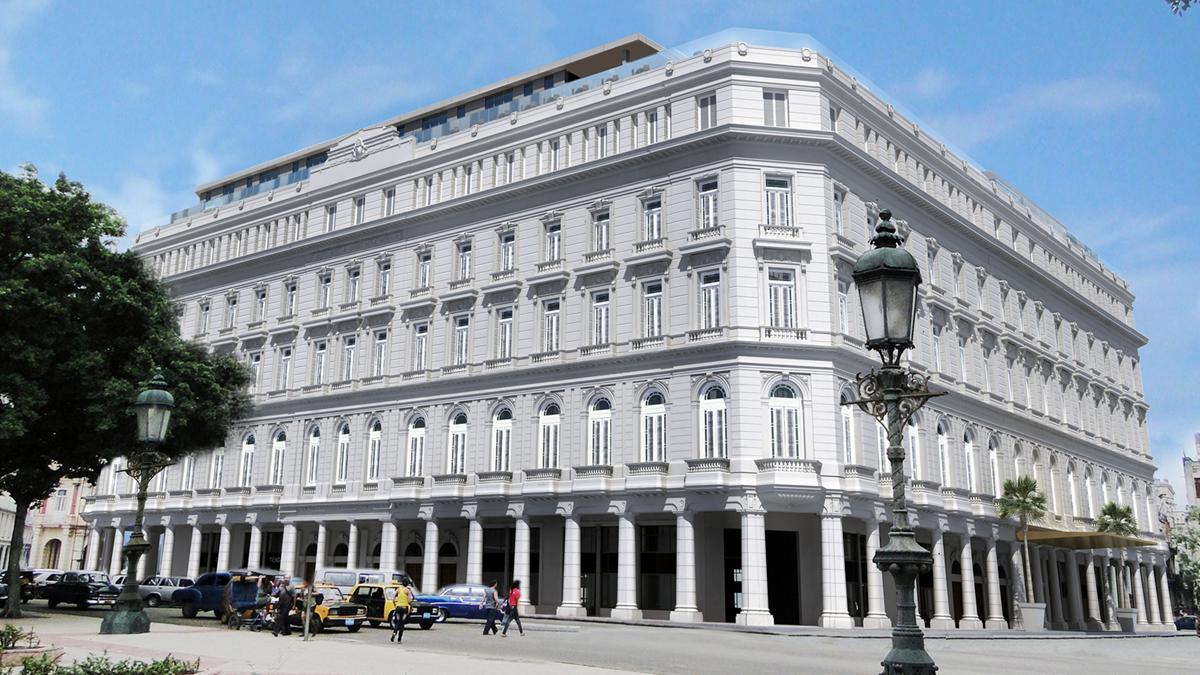
The five-star hotel Gran Manzana de Gómez is owned by Gaviota.
This luxury hotel has on the first floor stylish boutiques that sell perfume, stereos, Montblanc, Versace, and Armani goods. These stores are owned by CIMEX, a Cuban business conglomerate taken over by GAESA in 2010. CIMEX, founded by the Ministry of the Interior, includes financial services, a chain of shops, and import and export agencies.
Cuba today is a state capitalist run by the military Mafia element deeply embedded within communist Cuba. Obama’s shameful unilateral concessions to the oppressive communist regime and in violation of the Helms-Burton Law allowed American hotel chains to run hotels owned by the military.
Smith stated the following: “General Rodriguez has worked directly for Raúl Castro. He’s the gatekeeper for most foreign investors, requiring them to do business with his organization if they wish to set up shop on the island… General Rodriguez doesn’t just count Castro as a longtime boss. He is family. More than 20 years ago, Rodriguez, a stocky, square-jawed son of a general, married Deborah Castro, Raúl’s daughter. In the past five years, Castro has vastly increased the size of Rodriguez’s business empire, making him one of the most powerful men in Cuba. General Rodriguez’s life is veiled in secrecy. He’s rarely been photographed or quoted in the media, and his age isn’t publicly known.”
Smith pointed out that the Cuban dictator Raúl Castro has been slowly and cautiously opening the island to private enterprise since he assumed control of the country in 2006. There are now 201 types of private businesses permitted (restaurants and bed-and-breakfasts are the biggest categories), employing a million people or a fifth of the Cuban workforce.
The military dictatorship that runs Cuba imposes high taxes on all these small private businesses. These businesses can be closed at any time by the communist regime. Often, police and military show up at the private restaurants called “paladares” and eat for free. Dictator Raúl Castro has legalized the sale of homes and cars; allowed more travel to certain individuals and denied travel to others; and allowed private farming and cooperative businesses. It is estimated that Cubans own 2.6 million cell phones, although service is poor and expensive.
However, Smith pointed out that the Castro regime has kept the big-money industries in the hands of the state. Much of these industries are managed by his son-in-law. General Rodríguez’s Grupo de Administración Empresarial, S.A. or GAESA runs companies that account for more than half the business revenue produced in Cuba. Other economists say it may be closer to 80%, according to Smith.
Smith said that GAESA owns almost all of the retail chains in Cuba and 57 of the mainly foreign-run hotels from Havana to the country’s finest Caribbean beaches. GAESA has restaurant and gasoline station chains, rental car fleets, and companies that import everything from cooking oil to telephone equipment. General Rodríguez is also in charge of Cuba’s most important base for global trade and foreign investment, which is the new container ship terminal and 180-square-mile foreign trade zone in Mariel.
Smith said that for the majority of people in Cuba dictator Raúl Castro’s reforms have not delivered the most basic thing, which is a living wage. Salaries average just 584 pesos or about $24 a month. That is what it costs to buy 4.4 pounds of chicken breasts, a couple bags of rice and beans, and four rolls of toilet paper in one of GAESA’s Panamericana supermarkets.
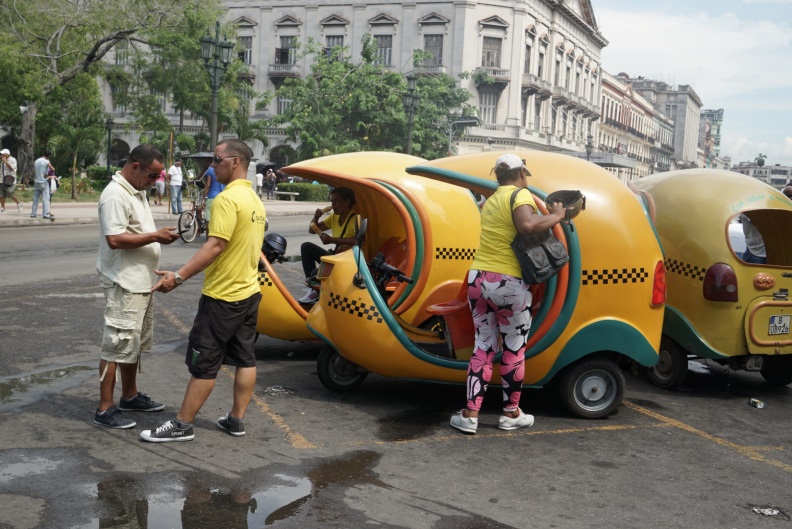
Havana’s Coco Taxis, named for their coconut shape. Drivers rent their vehicles from a state company.
During his visit to Cuba Smith learned that most of the people have “to scrape and hustle to put together a decent living.” Nearly everyone Smith met in Havana has a story of moonlighting in odd jobs or even stealing to make up for dismal pay. He pointed out that a friend of his father sells Cohiba cigars stolen from the factory where he works. A young engineer drives tourists around in his mother’s Lada, a Russian car, to supplement his $19.59 monthly salary as a university professor.
Smith said that Cuba’s most profitable state companies under GAESA are run by General Luis Alberto Rodríguez. The biggest addition to GAESA was Cimex, which had been run for three decades by military commanders chosen by Fidel Castro. Adding the Cimex companies more than doubled the size of GAESA. More recently, General Rodríguez took over Habaguanex, the state company that owns the best commercial real estate in Old Havana, including 37 restaurants and 21 hotels.

Most of the hotels and attractions at Varadero are owned by GAESA and run by international chains.
Conclusion
Cuban American patriots who worked very hard to elect Donald J. Trump as president hope that he will forbid American corporations from doing business in Cuba with dictator Raúl Castro’s military when he announces his Cuban new policy on June 16, 2017 at Manuel Artime Theater in Little Havana, Miami. Approximately 60% of Cuban Americans voted for Donald Trump on November 8, 2016.
Cuban Americans approved Republican presidential candidate Donald Trump’s promises that he would reverse Obama’s Cuban policy. Cuban Americans hope that the president would reverse, if not all, most of the shameful unilateral concessions done by Obama to the Cuban regime in exchange for nothing, except increase repression, beatings, and arbitrary arrest of peaceful opponents.
